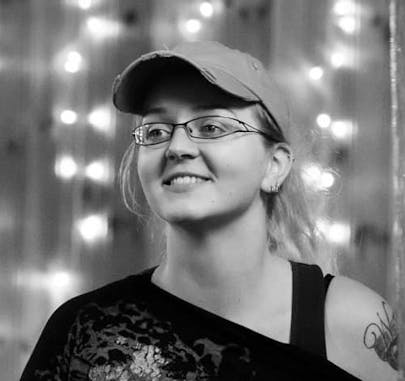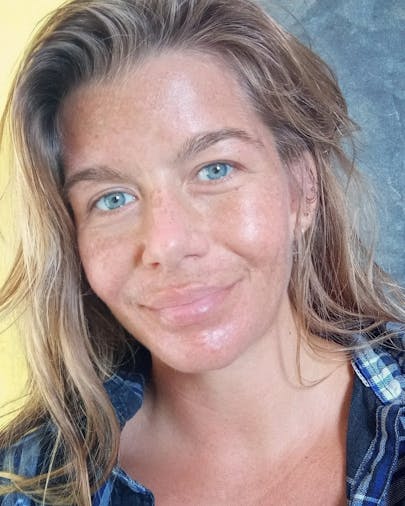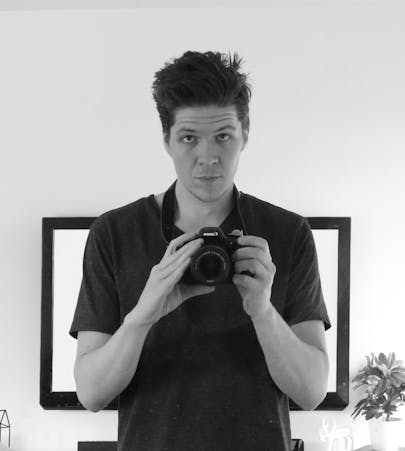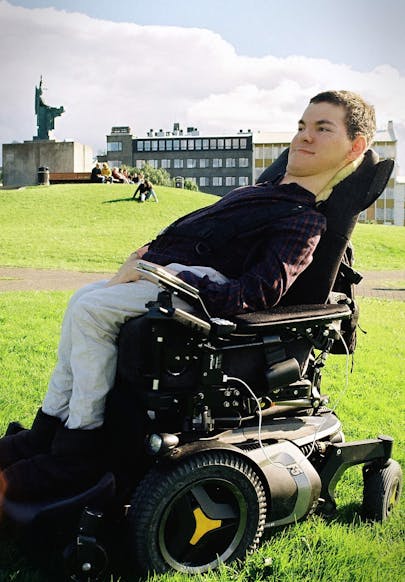Screenwriting & Directing
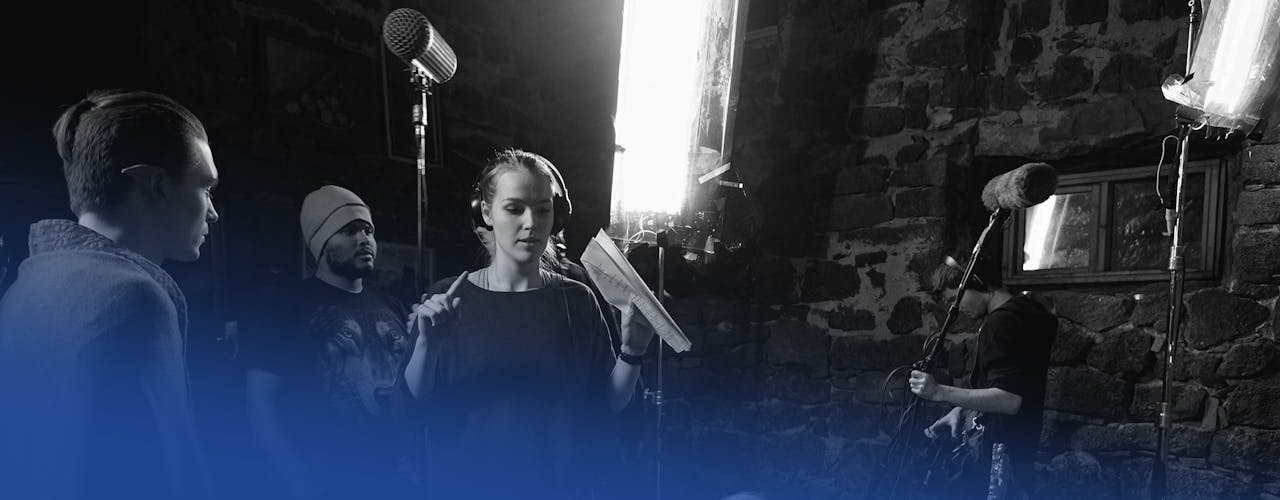
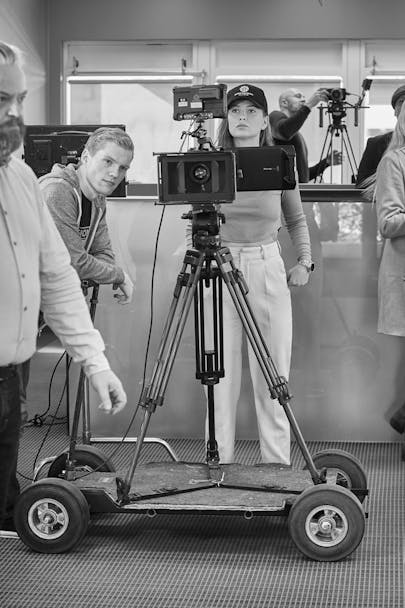
Make your own stories come to life
This department offers a versatile and creative course of study in the fields of writing and directing for the screen. You will learn various methods for developing your ideas and writing scripts for feature films, shorts, television and other visual media. You will also receive extensive training in directing your own scripts as well as those of others.
The Screenwriting and Directing department represents a perfect choice for those who wish to be the authors of their own films, write screenplays as well as direct. During this 120-credit diploma study (two years) students write scripts for various film genres which they in turn direct and bring to completion. The department has proven extremely popular and a vast number of dynamic filmmakers have graduated from the department.
The goal with the education is that upon graduation the student will have acquired a firm understanding of the basics of filmmaking and is capable of working independently on his or her own film projects as director, screenwriter or both. The department seeks students with an artistic vision and great ambition.
Find out more about the department’s syllabus in the curriculum.
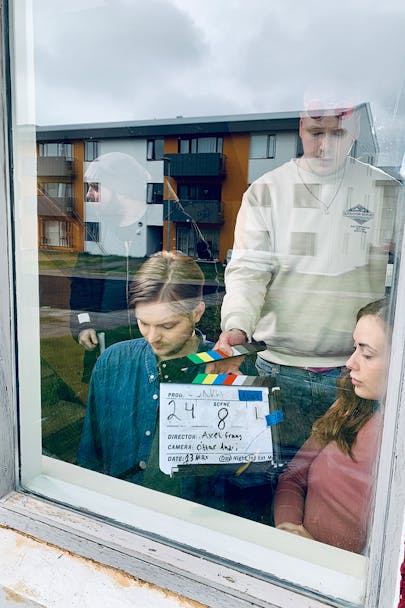
Department 3 prepares you for the following jobs
- Casting director
- Director
- First Assistant Director (first AD)
- Screenwriter
- Script Development Executive
- Script Editor
- Script Reader
- Script Supervisor (aka continuity)
- Second Assistant Director
SCREENWRITING AND DIRECTING DEPARTMENT HEADS

Heidar Sumarlidason
Heidar has an BA hons degree from The Icelandic University of the Arts in Theatre and performance making and an MA degree in Creative writing from The University of Iceland and in Directing from East15 in London. Now he is getting his teacher license at the Icelandic University of the Arts. Heidar has written stage works and screenplays, among his works is "90(210) Gardabaer", which was shown at The National Theatre, "Rautt brennur fyrir" which was shown in Borgarleikhusid, "Svin", a radio play which was performed on The National Broadcasting Stations Radio theatre and the film "Þad sem við gerum í einrumi" which was shown at Tjarnarbio. Heiðar has directed 10 plays in professional theatres; "Segdu mer satt" written by Havar Sigurjonsson, "Glerdyrin" written by Tennessee Williams, "Pizzasendillinn" written by Elisabet Jokulsdottir, among his own work, to name a few. Heidar is a film critic for Visir news media and has his own podcast "Stjornubio"
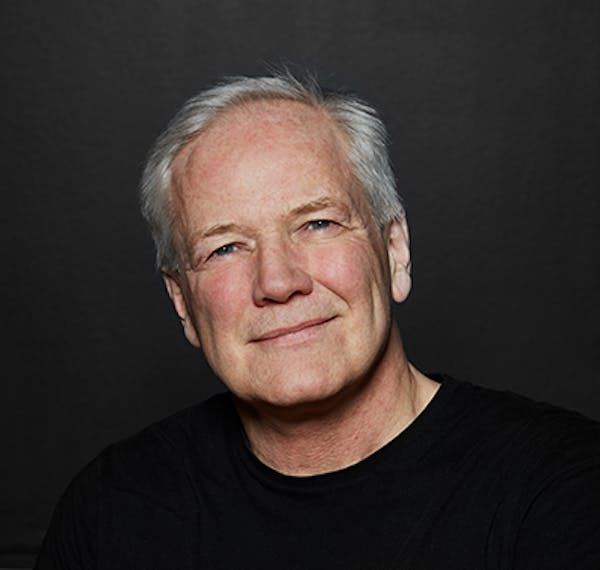
Hilmar Oddsson
Hilmar studied filmmaking at Hochschule für Fernsehehen und Film IN München in Germany. He premiered his first film in 1986 and since then Hilmar has made 5 feature films, 5 TV movies, 5 short films and over 25 music videos. He has made various documentaries and over 100 TV shows. He has directed two sitcom series and directed commercials and educational materials. Hilmar has talked about films in TV and written many articles about film related topics. He has taught filmmaking and acting for films for two decades at The Icelandic University of the Arts and at The Icelandic Film School, where he served as Dean from 2010 to 2017.
First Semester
In this workshop course the students work under the guidance of an instructor on the development of an idea for a feature motion picture. The structural elements of feature screenplays are also analyzed. The students write and turn in a 4-5-page synopsis.
Course outline PDF download
The role and position of the film director as an instructor and collaborator of the actor are analyzed: His or her relationship with the actor, the basis of this relationship and how it can be most rewarding. Emphasis is on fundamental training where students are introduced to the actor’s technical training process, exercises and characterization methods, what forms the inner life of a character that reflects in the character’s actions and behavior.
Course outline PDF download
This is a first semester beginners’ course and introduces students to elements of dramatic narrative all the way back to Aristotle. Students are introduced to the main theories and textbooks of screenwriting as well as being taught how to format a screenplay. The class is partly a workshop under the tutelage of an instructor where each student works with a short film concept and develops the idea into a 7 minute script. This script is then produced in the course HAN120G later in that semester.
Course outline PDF download
Different standard genres of TV series are examined; sitcoms, crime series, family dramas, etc. Students work on this kind of material in groups under the tutelage of an instructor in a so called writers’ room and gain insight into dramaturgy, dramatic structure, character development and the TV series format in this manner. The course is a precursor of HAN211G in the 2nd semester where students write a pilot for a dramatic TV series.
Course outline PDF download
This course examines the form and nature of film grammar. Specific examples from films are viewed and analyzed with regard to proportional representation, perspective, the composition of sequences, symbols and messages. There is also a practical component to the course where students direct, among other material, their own scenes. In addition, the course examines the preparatory process of the director before shoots, i.e making a shoot list.
Course outline PDF download
Students work on a short, a maximum length of 7 minutes, in a team effort with other departments where the students focus on the field of specialty of their respective departments. The goal is that the project be a completed film of some kind. Emphasis is placed on students working with their own ideas and capitalizing on the experience they have acquired in other courses throughout the semester.
Course outline PDF download
This is a first-semester beginners’ course and the goal is to teach students the basics of film production and the use and application of filmmaking equipment. Furthermore, the fundamentals of visual language are reviewed. The course is divided into three parts:
1. Preparation – Film production.
2. Location – Film and sound recording.
3. Post-production – Editing and finishing touches.
Course outline PDF download
Each semester students from all departments must earn credit in collaboration with other departments. The goal is that each department is ensured access to the other departments and to establish a thriving relationship between the departments.
Course outline PDF download
Some of the greatest works in the history of film are introduced, screened and discussed. Ten movies are shown each semester, a total of forty movies. Each semester represents a section of film history. The movies are screened mostly in a chronological order from the silent era well into the late twentieth century.
Course outline PDF download
Second Semester
This is a 2nd semester continuing course and the goal to have the students develop an idea for a full-length feature which will prove useful in HAN303G. The students hand in a 5-6-page outline following a thorough preparation of the structure of the story, character development and narrative method.
Course outline PDF download
This course continues to explore the main principles of film directing with particular emphasis on working with actors. Through practical, hands-on training students are introduced to a variety of methods and tools to direct actors. The students learn to plan their work process thoroughly through exercises with actors.
Course outline PDF download
Drawing on the synopses students wrote in HAN110G as a point of departure, they write a draft for a dramatic TV pilot based on their own idea. The students work under the guidance of an instructor and collectively in a so called writers’ room.
Course outline PDF download
The course examines various and different forms of documentary films, their origin and history. A special emphasis is placed on examining different methodologies. The idea development and screenwriting process are investigated, the artistic choices in the shooting and post-production process. The students must come up with an idea for a documentary, conduct research and write a short documentary script subsequently to be produced that semester in the course HAN221G.
Course outline PDF download
An overview course focusing on the relationship between film and painting. What can film learn from painting? The characteristics of different periods of art history are examined. Examples of close relationships between films and certain paintings or artists are cited and how filmmakers have drawn on and been inspired by painting.
Course outline PDF download
Students direct a documentary based on the script they wrote in HAN212G earlier in the semester.
Course outline PDF download
This course is in continuation of KJA101G. The goal is to further strengthen the basic technical knowledge of the students in the main fields of filmmaking. Each student then makes a film showcasing a personal style and the student’s skill in his or her field of interest. The film should be able to serve as a promotional calling card for the student.
Course outline PDF download
Each semester students from all departments must earn credit in collaboration with other departments. The goal is that each department is ensured access to the other departments and to establish a thriving relationship between the departments.
Course outline PDF download
Some of the greatest works in the history of film are introduced, screened and discussed. Ten movies are shown each semester, a total of forty movies. Each semester represents a section of film history. The movies are screened mostly in a chronological order from the silent era well into the late twentieth century.
Course outline PDF download
Third Semester
In this course the student expands his or her treatment from the course HAN202G into a full-length feature screenplay (85–100 pages).
Course outline PDF download
This course continues the work from previous directing courses. Students develop their own methods for working with actors further, in addition to being introduced to the main trends in film acting and directing actors. The course assignment consists of rehearsing scenes from screenplays, directing actors through the scenes and recording them. The relationship between the actor and the camera is examined as well as the principles that apply to positioning and eye-line matches, as well as the influence that camera position has on the performance and movements of the actor. Other key factors of film directing, such as the relationship with the cinematographer and other intimate collaborators, are examined.
Course outline PDF download
This course is conducted as a workshop in collaboration with the Acting Department. Screenwriting students further develop different texts and monologues improvised by acting students under their instructor’s guidance. The writers then hand in a completed script which the Acting Department stages as their final project.
Course outline PDF download
The process of adapting previously published printed material into cinematic form is examined. The fundamental differences between the literary and cinematic form, which must be taken into consideration and understood during the process of adaptation, are investigated. A host of adaptation examples are evaluated and analyzed and a special emphasis placed on adaptation in the history of Icelandic film. The students must complete a project and in addition write a 7-10-page script based on a previously published text. The students subsequently film their script that semester in the course HAN322G.
Course outline PDF download
The students complete a short based on a script written in the course HAN322G earlier that semester.
Course outline PDF download
A look at visual language and composition by viewing and analyzing film scenes from various periods. The students stage a film scene in consultation with instructors and examine the visual language impacts narrative progression and the audience’s experience of the film.
Course outline PDF download
Each semester students from all departments must earn credit in collaboration with other departments. The goal is that each department is ensured access to the other departments and to establish a thriving relationship between the departments.
Course outline PDF download
Some of the greatest works in the history of film are introduced, screened and discussed. Ten movies are shown each semester, a total of forty movies. Each semester represents a section of film history. The movies are screened mostly in a chronological order from the silent era well into the late twentieth century.
Course outline PDF download
Fourth Semester
In this course the student works under the guidance of an instructor on a first-draft rewrite of his or her screenplay from the course HAN303G
Course outline PDF download
The course is linked to the semester’s final project where the directorial strategies of each individual project are examined and reviewed from the standpoint of the screenplay and the director’s personal take. Students are expected to draw on the methods they have learned and developed in relation to their collaboration with the actor and visual narratives.
Course outline PDF download
The course offers support for the thesis project. Various methods of idea development are employed to strengthen the script for the thesis film.
Course outline PDF download
The department head selects a course in a field where he or she feels that the students need additional knowledge, e.g. cinematography, editing, production or post-production sound. He or she does this after consultation with the students at the beginning of semester.
Course outline PDF download
The role of the producer and different aspects of his or her job are examined. The motion picture process from concept to final distribution and the role of the producer and production manager at various production stages are thoroughly explored. The main funding methods and types of contracts in the filmmaking world are introduced. Also examined are the fundamentals of copyright. The course is linked to the thesis film process in course HAN423G.
Course outline PDF download
This is an individual project where the student writes and directs a 8-12-minute short. The project is also the student’s graduation piece and strong emphasis is placed on ambitious craftsmanship in all production aspects. The student him- or herself is the main supervisor over the project and is responsible for directing and writing the film but is encouraged to have a smoothly functional and professional production team and crew bringing all phases of production to a satisfactory standard. The students work under the guidance of an instructor.
Course outline PDF download
This course covers contemporary filmmaking. What trends and vogues have been prevalent during the last decade? What is happening right now and what does the near future hold in store? The course emphasizes student participation in finding answers to these questions. Each student makes a presentation with film samples where he or she discusses contemporary influences and artists.
Course outline PDF download
Each semester students from all departments must earn credit in collaboration with other departments. The goal is that each department is ensured access to the other departments and to establish a thriving relationship between the departments.
Course outline PDF download
Some of the greatest works in the history of film are introduced, screened and discussed. Ten movies are shown each semester, a total of forty movies. Each semester represents a section of film history. The movies are screened mostly in a chronological order from the silent era well into the late twentieth century.
Course outline PDF download
This course is intended to prepare students for entering the workforce. The establishment of companies, the most common types of job contracts are examined as well as the responsibilities they entail for contractors and clients or employees and employers. Fees and taxes which have to be accounted for are studied, such as VAT, pension funds, union memberships, etc. Students work on a grant application to The Icelandic Film Centre along with a budget plan.
Course outline PDF download
